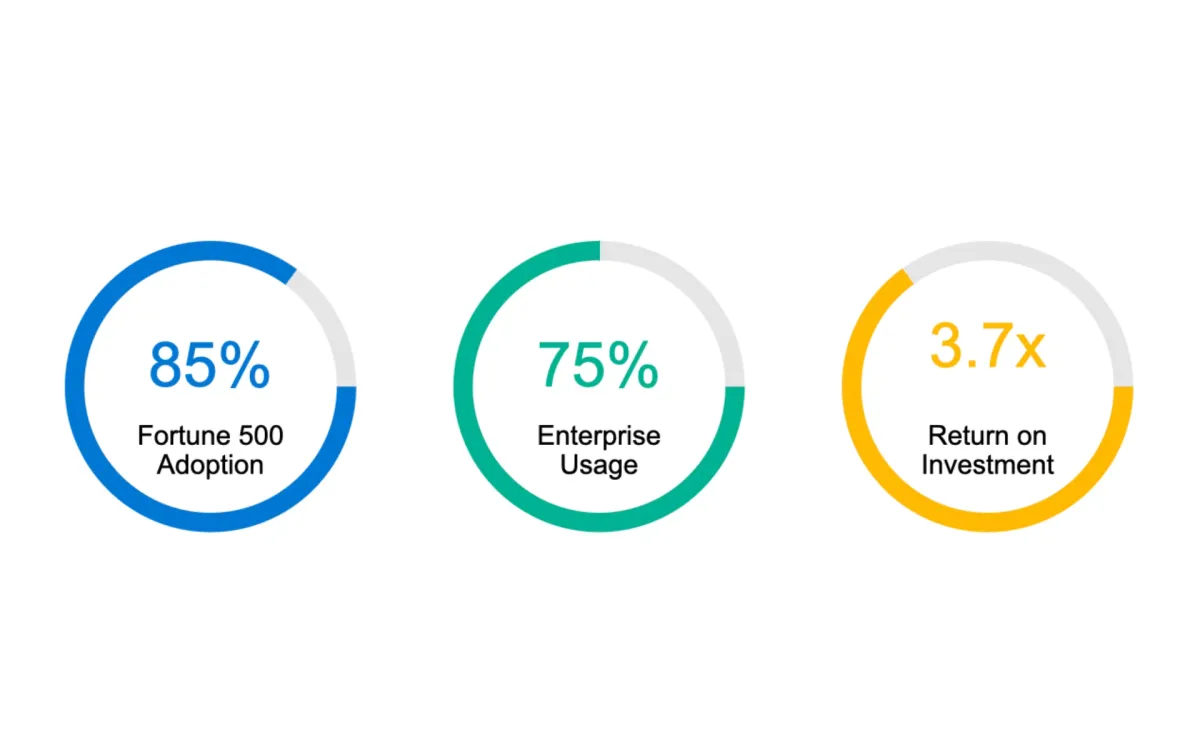
Microsoft last week revealed at its annual Ignite event that enterprise organizations worldwide have dramatically increased their adoption of generative AI technologies, with usage rising from 55% in 2023 to 75% in 2024. The announcement highlights how major corporations across healthcare, manufacturing, logistics, and financial services are leveraging Microsoft's AI stack to transform their operations and achieve measurable business outcomes.
According to internal Microsoft data and third-party research by IDC, organizations are experiencing a return on investment of $3.70 for every dollar invested in generative AI technologies. This significant ROI comes as Microsoft reports that more than 85% of Fortune 500 companies are now utilizing Microsoft AI solutions, with nearly 70% specifically implementing Microsoft 365 Copilot.
The implementation of Microsoft's AI technologies has yielded substantial results across various sectors, with organizations reporting significant improvements in efficiency, productivity, and customer satisfaction.
In the manufacturing and operations sector, ABB Group has developed Genix Copilot using Microsoft Azure OpenAI Service. The solution has transformed their operations, delivering 40% cost savings in operations and maintenance, along with a 30% increase in production efficiency. Sustainability metrics have improved by 25%, while sales momentum has accelerated by 20%. Perhaps most notably, the company has experienced an 80% reduction in service calls, dramatically improving customer service efficiency.
The aviation industry has seen similar transformative results. Air India's migration to Microsoft Azure and implementation of AI.g, their virtual assistant, has revolutionized their customer service capabilities. The system now processes 30,000 daily customer queries, automating millions of customer interactions. Despite doubling their passenger count, the airline has maintained consistent call volumes while achieving significant cost savings through reduced call center load.
In the spirits industry, Campari Group's implementation of Microsoft 365 Copilot has delivered remarkable productivity gains. Employees are saving between 16 and 30 minutes daily, with 80% of users reporting accelerated task completion. The impact on work quality has been equally impressive, with 86% of users noting improved output. Mental effort for routine tasks has decreased by 73%, while user confidence in the tool remains exceptionally high at 93%.
The logistics sector has experienced dramatic improvements in efficiency through AI implementation. C.H. Robinson's deployment of Microsoft Azure AI has transformed their email quote process, reducing response times from hours to just 32 seconds. This automation has contributed to a 15% increase in overall productivity and significantly enhanced their global supply chain operations.
Marketing analytics has seen similar advancements. Dentsu's utilization of Azure AI Studio and related services has resulted in an 80% reduction in analysis time, while simultaneously improving model accuracy. The company projects millions in savings through optimized advertising spend, with media planning processes now operating at unprecedented speeds.
In manufacturing documentation, Eaton Corporation has achieved remarkable efficiency gains through Microsoft 365 Copilot. The system has reduced documentation time for standard operating procedures by 83%, successfully processing over 9,000 SOPs. This improvement has enhanced both knowledge management and operational efficiency throughout the organization.
The technology support services sector has also seen significant improvements. Lenovo's implementation of Dynamics 365 Contact Center and Customer Service with Copilot has reduced average handling time by 20% while increasing agent productivity by 15%. These improvements have led to higher customer satisfaction ratings and more efficient service delivery overall.
In veterinary healthcare, Mars Veterinary Health's implementation of the Mistral Large Language Model through Azure AI Studio has transformed diagnostic processes. What once took days now takes minutes, leading to improved pet survival rates in critical situations and more efficient radiologist workflows.
Occupational health services have experienced similar transformations. Medigold Health's Azure-based automation has increased clinician retention by 58% while significantly improving job satisfaction. Report generation time has been reduced to just 15 seconds, allowing healthcare professionals to achieve a better work-life balance.
In oncology research, Ontada's implementation of Azure AI services has cut processing time for unstructured data by 50%. The system now analyzes over 150 million oncology document components, accelerating research and development processes while enhancing insight extraction from complex medical data.
Toyota Motor Corporation has leveraged Azure OpenAI Service to preserve critical engineering expertise and accelerate vehicle development processes. The system has improved knowledge transfer between generations and enhanced decision-making through AI-powered agents.
The future of AI investment shows strong growth potential, with IDC forecasting worldwide spending to reach $632 billion by 2028. This projection reflects growing confidence in AI technologies and their proven ability to deliver measurable business value across industries.
These successful implementations rely on a comprehensive suite of Microsoft AI technologies, including Microsoft Azure OpenAI Service, Azure AI Studio, Azure Machine Learning, Azure Cosmos DB, Azure SQL Database, Microsoft 365 Copilot, Dynamics 365 Contact Center, and Dynamics 365 Customer Service.
The data shows enterprise adoption reaching 75% as of 2024, with 85% of Fortune 500 companies now using Microsoft AI and 70% specifically implementing Copilot. The average return on investment stands at $3.70 per dollar invested, with global AI spending projected to reach $632 billion by 2028.
Customer query processing capabilities now handle up to 30,000 interactions daily, while employees save between 16 and 30 minutes per day on routine tasks. Productivity increases range from 15% to 80%, with process time reductions of up to 80%. Documentation efficiency has improved by up to 83%, and customer service operations now handle interactions 20% faster than before implementation.

